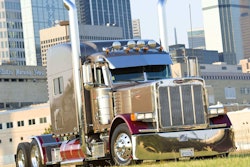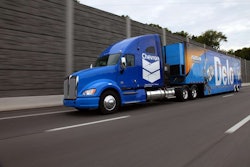Truckers should make sure their tires are properly mounted, suit the hauls they carry and are fuel-efficient, experts said Friday during a tire technology seminar at the Great American Trucking Show in Dallas.
Tires “are one of the top three expense items owners have,” said Clif Armstrong, Continental Tire commercial vehicle marketing director. He was joined by Don Baldwin, Michelin’s commercial tire product category manager; Harvey Brodsky, Retread Tire Association managing director; and Erica Graves Walsh, Bridgestone’s engineering manager for original truck and bus tires. Commercial Carrier Journal Executive Editor Jack Roberts moderated the discussion.
The Compliance Safety Accountability program, which places much greater stress than before on truck inspections, makes it more important than ever to have tires that are well maintained, the panel advised.
Having a calibrated gauge for pressure readings is essential, Armstrong and others noted. “With CSA, you have to know what the air reading is in your tire.”
Use of proper compounds, tread design, sidewall and bead design and reduced truck weight can help fuel economy, the experts said.
“We use compounds that generate less heat,” Armstrong said of the tires made for long haul and regional haul.
Baldwin noted that sidewall and bead area design is critical for reducing rolling resistance.
Tire maintenance is also important for achieving optimal fuel efficiency, the panel said. The U.S. Environmental Protection Agency’s SmartWay certification program recognizes tires that are fuel-efficient.
“You’ve got to take care of your tires,” Brodsky said. “Check them with a calibrated gauge and don’t drive like a mad man.”
The panel also recommended that tires should be maintained at 100 psi (80 psi is considered underinflated), the tread be matched for the truck’s application and routes and the tire be properly mounted with enough lubrication to seat properly.
The Radial Conditions Analysis Guide, available at all tire dealers, is a helpful source for tire concerns, the panel said. “It gives you a checklist of what you could be experiencing and why,” Armstrong said.








